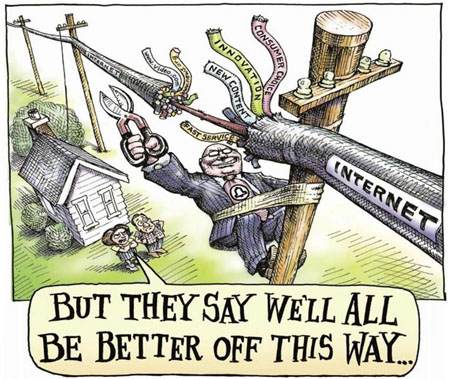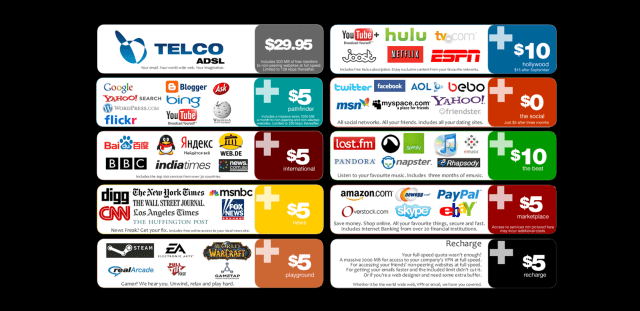It’s possible that you’ve seen the words “net neutrality” around before and not been totally sure what they’ve referred to; it’s possible that’s happened more and more often recently. Net neutrality is the idea that all internet content should be treated equally, and that ISPs and governments shouldn’t be charging different users, companies or content differently or otherwise discriminating against users, companies or individual websites. Net neutrality suffered a huge blow on January 14th of this year when a US federal appeals court gutted all the rules that keep ISPs (mostly large corporations) from doing things like blocking lawful websites or applications. They could do that if, you know, something on that website competes with their services. Or if they just feel like it—like if they don’t like what the website or application is saying, even if it’s completely within the website or application administrator’s rights to do so. Or they can slow down an independent website’s speed while favoring a well-paying corporation’s website.

Let’s imagine a few scenarios here, shall we? These are all out of my own head—they’re not confirmed by any university studies or anything. They’re simply predictions backed up by a few anecdotes and that’s all they are. But they’re certainly not impossible.
Let’s look at Bustle as compared to other websites that traffic in women’s media. Bustle is owned by rich white dude Bryan Goldberg and he poured $6.5 million into its creation. In contrast, Autostraddle is basically funded by creativity, hopes and dreams (and viewers like you). If Verizon wanted to slow down our speeds (and the speeds of sites like Bitch and The Toast and allllll those others that we all love so, so dearly) and put the speed that they’re really capable of behind a wall that only Bustle can afford, they can legally do that. Many of us close websites that don’t load. I always assume it’s over-designed or poorly coded or something, but in the future that might not be the case. The Pavlovian conditioning of users to go for better/faster websites will start to happen, and attention will be steered (even moreso than it already is) to websites backed by large corporations.
It’s also always possible that the people in charge of an ISP just don’t like queers. Ever had a company you work for block a website because of “homosexual content?” I have. Now imagine that the friendly folks over at Verizon or Comcast or AT&T are doing that to you in your house. They can now legally do that also. Imagine that your personal internet gods can block every competitor, every dissenting opinion — not just the stuff that is harmful or illegal, but just the stuff that is harmful for that corporation in some way. There’s going to be an appeal, but my faith that this will just right itself isn’t strong.
The amount of net neutrality and freedom that we’re talking about right now is a pipe dream for some — I have never had the personal experience of sitting in an internet café and being looked down upon by a poster of a dictator, but I’m familiar with at least one person who has experienced that. I know that there are some countries out there who are just a little bit closer to 1984 than I am, sitting at my desk with my computer.
The argument that American companies won’t ever do that is a tempting kneejerk reaction because it’s basically a business suicide move here in the States. A corporation telling adults what lawful content they can and can’t view in their own homes? A corporation conditioning us to look at the shiny, high-paying website instead of the scrappy independent one? Wouldn’t people be up in arms about that? But it really doesn’t sound so far off base, especially if no one really knows it’s happening. Our creative content is already modulated for us when companies like Wal-Mart refuse to sell it if they disagree with its language and content; corporate lobbies affect even our nation’s nutritional standards. If we don’t talk about it now, ish like this can fuck up our internet.

It’s now over a month after the initial net neutrality ruling in January, and Sean Howard, the CEO of Hornet (a gay social network), and Peter Ian Cummings, who published XY magazine from 1996-2007, have written this gem of a piece (not being sarcastic, really is a gem of a piece) on The Humanist. They’ve pointed out exactly what happens to queer-focused businesses like ours when net neutrality suffers:
…history shows that given such power, some corporations and governments will inevitably use it to censor content they dislike.
In our experience in many countries across several decades, gay and “immoral” content is often the first to fall. There are many examples: Facebook treats gay content unequally right now, South Korean ISPs routinely ban gay content, and even the UK’s British Telecom blocked gay social networks in the early 1990s, putting several of them out of business.
They’ve also highlighted a bit of a perfect storm—the Trans-Pacific Partnership is a trade agreement that would affect eleven Pacific countries. It would legislate ISPs to a degree that it would legally mandate the infrastructure to “deep monitor.” This means that ISPs would be responsible for reporting copyright infringement, so they’d be monitoring everything. That means this trade agreement, something the current administration is attempting to fast-track with little public discourse (something that’s happening in Australia too, looks like), would legally mandate that the ISPs have a proverbial gun with which to fire the bullet the appeals court gave them last month. With the monitoring infrastructure, they really could block websites with which they disagree. They could make websites pay to be carried. They could kill net neutrality.
So at this point, what are we going to do? Well, the FCC may be able to stop the madness by reclassifying the internet. The ACLU puts it the best:
The FCC can still protect the Internet. The agency was not blocked outright by the January court decision from enforcing network neutrality principles. It was blocked from doing so because it had classified broadband carriers as “information services” as defined in the 1996 Telecommunications Act. However, that classification never made sense; broadband carriers always fit much better under the law’s definition of “telecommunications services.” To remedy this, all the FCC has to do is reclassify Internet carriage as a “telecommunications service,” which would automatically subject online communications to common carrier protections.
You can sign this petition addressing the FCC and asking them to do that. This petition, by the way, includes one of the scariest predictions of our potential future dystopian hellscape by far:
Dear Customer,
Sorry your requested website is loading slowly—Sony Music Entertainment has purchased today’s hi-speed Comcast bandwidth and it seems you are not within their target demographic. To remedy this, please select a Miley Cyrus video to watch or try loading your New York Times article again tomorrow.
That is just not a world I want to live in.

